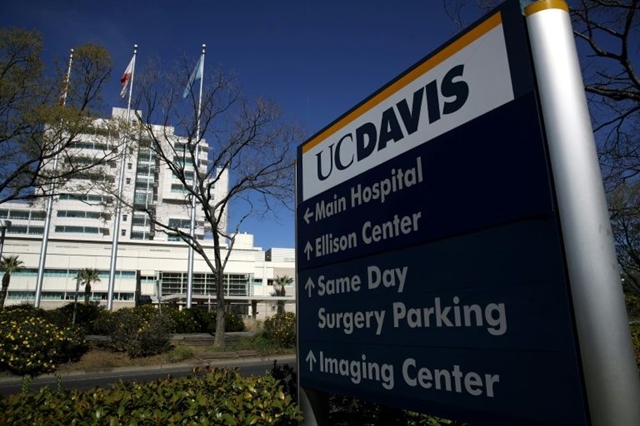 World
World


|
| A women with the first-known US case of the new coronavirus acquired through community transmission was admitted to UC Davis Medical Center on February 19, 2020.— AFP/VNA Photo |
LOS ANGELES — Medical staff caring for a California woman with the first US case of novel coronavirus of unknown origin were unable to get her tested for five days because she had not traveled to outbreak-hit regions, a lawmaker revealed on Thursday.
The development comes amid reports citing a whistleblower complaint that federal health workers interacted with quarantined patients in two California air bases without proper gear or training, before dispersing around the country.
One of these sites, Travis Air Force Base, is in Solano County, where the ill woman is also from.
In a congressional hearing, Representative Ami Bera said the patient was admitted to the University of California Davis Medical Centre on February 19 and quickly placed on a ventilator.
The same day, her doctors asked to submit a sample for a coronavirus test to federal authorities.
But it was not until February 23, after her condition had worsened, that there was "an insistence and a strong push and ultimately the patient did get tested," added Bera, a doctor who once worked at the same hospital.
He said he learned of the case details from former colleagues.
It took another three days for the positive result to return, and the Centres for Disease Control and Prevention (CDC) on Wednesday declared it the first suspected case of community transmission.
This means the source of infection is unknown, a sign that the pathogen is no longer contained.
If confirmed, the development represents a new and more complicated challenge in the battle against the virus in the US.
Bera, who chairs the House Foreign Affairs Subcommittee on Asia, the Pacific and Nonproliferation, questioned CDC director Robert Redfield, who said the agency's testing guidelines were updated on Thursday as a result of the case.
Difficult to recognise
"The recommendation should be when a clinician or public health individual suspects coronavirus, then we should be able to get a test for coronavirus, so that's the current guidance that went out today," said Redfield.
The official testified that what made the coronavirus particularly difficult to recognise is that infected people can show no symptoms and spread it.
Or, they may have only mild symptoms like a scratchy throat or dry cough. Brian Garibaldi, a public health expert at Johns Hopkins Hospital in Maryland, said he expected the number of cases being tested in the US to surge as a result of the new guidelines.
Whistleblower complaint
A whistleblower complaint cited by US media including the Washington Post and New York Times said federal health employees were sent to interact with repatriated Americans at the two bases without protective gear or training.
The filing was submitted by a senior official in the Department of Health and Human Services (HHS) who said she was improperly re-assigned after raising her concerns and threatened with being fired if she did not comply.
In total, there were just under 30 workers who were exposed in this way in late January and early February, the complaint said.
Speaking at an earlier news conference in California, Governor Gavin Newsom said California was now monitoring 8,400 people for possible infection.
But he sought to reassure the public that the risk of contracting the virus remains low.
Newsom told reporters his team was working with the CDC on making improved testing methods the top priority.
"We are not overreacting but nor are we underreacting to the understandable anxiety," he said.
He added the state had only 200 testing kits and had appealed for more from the federal government. Redfield later told Congress more tests were on their way.
Overall there are 61 cases in the US - including 46 people who were repatriated from abroad.
More than 80,000 people have been infected worldwide and 2,800 have died, mostly in China, where the virus originated late last year. — AFP